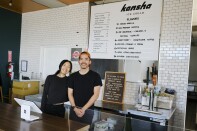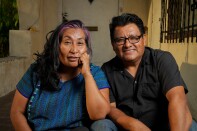This story is free to read because readers choose to support LAist. If you find value in independent local reporting, make a donation to power our newsroom today.
LA fires and federal budget cuts could leave more Angelenos hungry

Cuts in federal funding and potential inflation brought on by tariffs are putting pressure on L.A. food banks at a time when they say demand is nearly at an all time high after the January firestorm.
In March, food banks nationwide received notice that the U.S. Department of Agriculture suspended $500 million in funding that included 330 truckloads of food meant for California.
The move left many food banks struggling to do more with less.
“ We would have less food to distribute, but life is going to go on. Everyone's going to keep working,” said Genevieve Riutort, CEO of Westside Food Bank, which partners with 60 other agencies across Los Angeles.
Riutort said the food bank gets between 20% and 25% of its supplies from the federal government, so the halt on deliveries meant people missed out on blueberries, cheeses and other types of proteins.
“ We might have to buy more beans and less canned tuna because we have to find less expensive sources of protein,” Riutort said.
The drop in support also forced them to turn to their own funds to supply those options.
Demand for food jumped 30% after the January fires destroyed thousands of homes and businesses.
“That's really challenging because, you know, we're already dealing with less donated dollars and increased need,” Riutort said. “So it just means we're going to have to make difficult choices.”
A growing food insecurity crisis
The funding gap could mean fewer options for Angelenos in need. A study from USC Dornsife found that 832,000 households in Los Angeles experienced food insecurity last year.
“I’m sure those numbers will go up,” said Roger Castle, the chief development officer for the L.A. Regional Food Bank. He said during the fires, people didn’t just lose their homes, but also their neighborhood grocery stores.
Castle said rising rents in L.A. are another reason why people are turning to food banks.
L.A. Regional food bank serves 1 million customers each month.
“Many people are needing food assistance for the first time because of inflation. We're seeing people in academia losing their jobs, people in aerospace, because of potential cuts to government contracts,” Riutort said.
Adding to that, economists predict food prices will rise as the Trump administrations tariffs take effect. That could mean grocery store trips will become more expensive as prices for things like beef, cheese and seafood go up.
“ The need that we are seeing at California food banks today in our communities is at an all time high. It is similar to the peak of the pandemic. Nearly one in five Californians in their households are facing food insecurity,” said Stacia Levenfeld, CEO of the California Association of Food Banks.
But despite it all, Riutort is encouraging people to seek help if they need it.
“ This is a systems problem, not an individual people problem. And I would just encourage people to know that the food bank network is there to support them,” she said.
Public funding is drying up
The high demand is exacerbated by the fact that food banks in L.A. will have fewer sources of funding to tap this year.
In March, federal officials temporarily cut the Local Food Purchase Assistance Program that allowed food banks to buy products from local farmers.
California food banks buy from more than 550 farms across the state. Now they have only until the end of summer, when their contract expires to buy from local farmers.
For the Westside Food Bank, that cuts further into their funding with about one-fifth of their food supply disappearing.
“ It's hurting food banks because we were able to order from farms wonderful foods that we don't have other sources for,” Riutort said.
What’s being done?
Gov. Gavin Newsom filed an appeal asking the USDA to reverse the ending of the purchase assistant program.
But it’s unclear if that will help.
The governor’s proposed budget for the upcoming fiscal year could cut many food programs like CalFood. The state program, which purchases food from local producers and farmers, could have its funding slashed to $8 million, from around $60 million.
“ That won't just impact food banks, but also those local farmers and food manufacturers, tortilla makers, fishermen on the coast that won't be able to participate in that program with us any longer,” Levenfeld said.
In the meantime, leaders are asking for more help and monetary donations.
“ This is a time when we're really asking the community to dig deep and to support their local food bank because we’re doing everything we can,” Riutort said.











